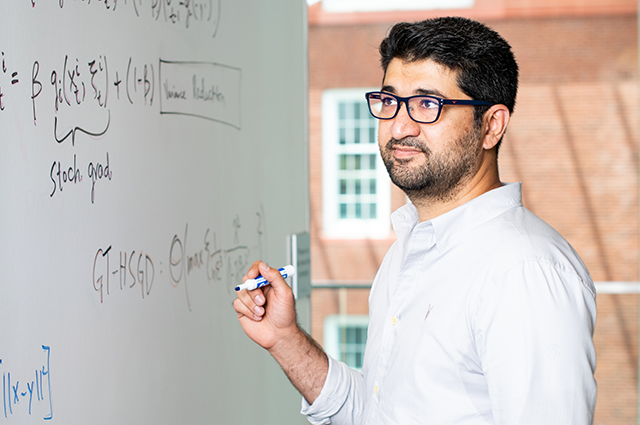Research team awarded for paper on signal processing

A team of researchers from the Department of Electrical and Computer Engineering at Tufts University recently accepted the Best Paper Award from the European Association for Signal Processing (EURASIP). The award will be presented at the 2022 European Signal Processing Conference (EUSIPCO) and honors the Tufts authors of a 2019 paper: Associate Professor Usman Khan and alumni Ran Xin, EG18, and Chenguang Xi, EG16.
EURASIP’s Best Paper Award honors four papers that have been published in journals sponsored by EURASIP within the past four years. The four-year time-frame ensures that only the most important and influential ideas in the field are considered for this honor.
The team’s award-winning article, titled “FROST— Fast row-stochastic optimization with uncoordinated step sizes,” was published in the EURASIP Journal on Advanced Signal Processing in January 2019. The article developed an algorithm that works over undirected communication networks and has a wide range of practical applications, from machine learning to computer security, particularly when communication among the network nodes is too costly.
Undirected communication refers to signals that “migrate like gossip moving through a crowd,” says Khan. This mode of undirected communication is common in nature. Khan likens it to a swarm of bees. Only the bees flying at the front of a swarm receive direct signals about upcoming obstructions in their flight path. The entire swarm must work together to avoid the obstacle without looking at the obstacle directly. Much like a swarm of bees avoiding a tree in their flight path, the algorithm developed by Khan, Xin, and Xi is able to perform machine learning tasks over a network of machines when the information about the task is scattered arbitrarily within the network.
Khan joined Tufts in 2011 and researches data and network science, systems and control, optimization theory, and algorithms with applications in autonomous multi-agent systems, Internet of Mobile Things (IoMTs), fleets of driverless vehicles, and smart-and-connected cities. He is the director of the Signal Processing and RoboTic Networks (SPARTN) Laboratory at Tufts.
Department:
Electrical and Computer Engineering